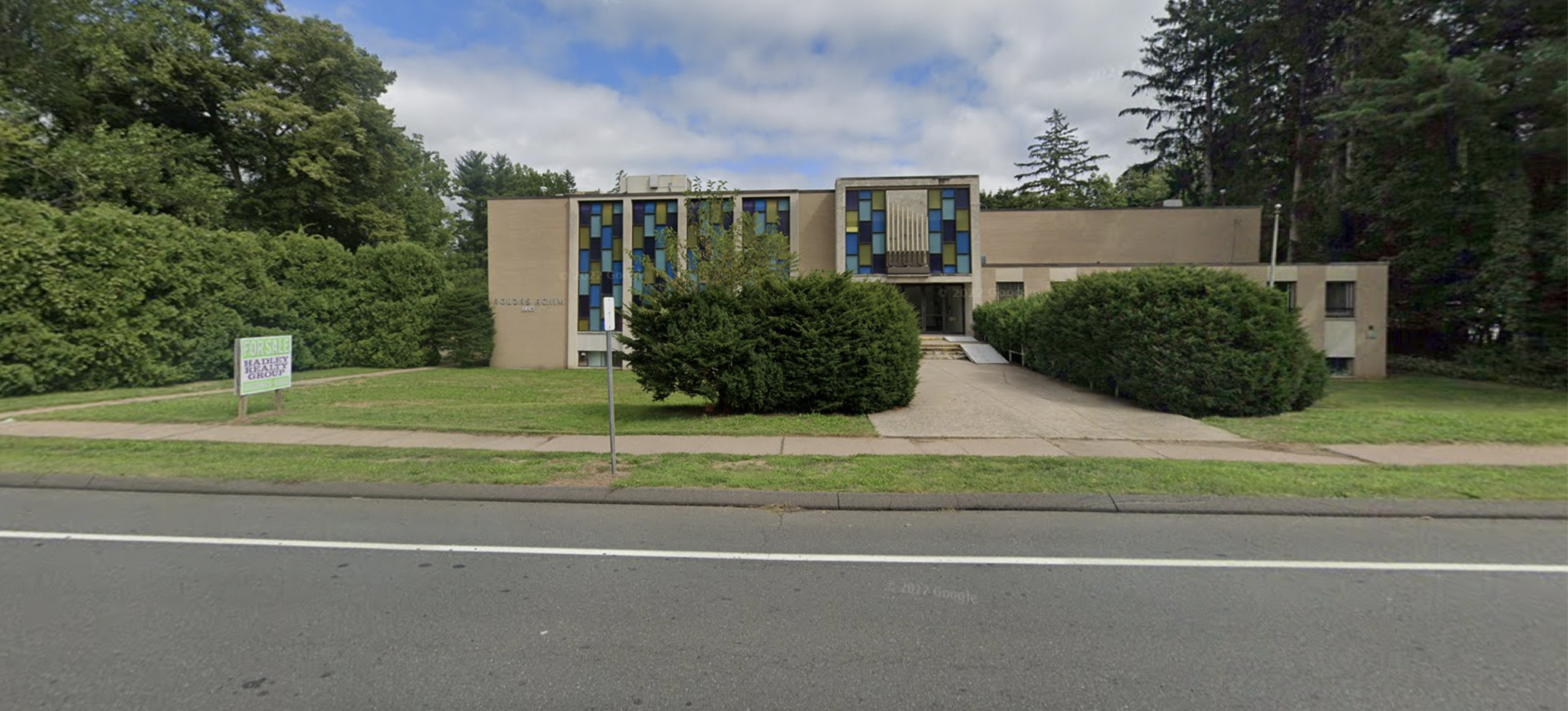An unused synagogue building in Connecticut could soon become affordable housing
Agudas Achim’s distinctive facade would be preserved under the development scheme

Agudas Achim’s distinctive facade would be preserved under a redevelopment scheme for the former West Hartford, Connecticut, synagogue building. (Google Maps)
(JTA) — A vacant West Hartford, Connecticut, synagogue building, shuttered in 2018, could soon turn into 49 apartments — including affordable housing, a local newspaper has reported.
Agudas Achim, an Orthodox congregation established in 1887 that primarily served Romanian immigrants, moved to its third permanent location in the building in 1969. Five years ago, it merged with another congregation, United Synagogues, and the building went up for sale the following year. Now the property, which the city appraised at about $2.5 million, is under contract.
Trout Brook Realty Advisors, the nonprofit development arm of the West Hartford Connecticut Housing Authority, is developing the new housing complex. Both of the possible redevelopment plans would incorporate the synagogue building’s facade — which includes a distinctive ground-to-roof pattern of brightly colored windows — and not require the building’s demolition.
“We are really excited about it,” Jill Corrado, CEO of Trout Brook and executive director of the West Hartford Housing Authority told the Hartford Business Journal. “It’s a cool adaptive reuse of an existing structure. We wanted to pay tribute to it by not demolishing the entire structure. It has some cool features we want to preserve.”
The West Hartford project is a solution to two problems that have vexed many: what to do with synagogue buildings when their congregations shrink, relocate or otherwise shift, and a crisis in housing affordability across the United States.
A handful of efforts are underway to tackle both challenges at once. In California, a legislator who says he is driven by his Jewish identity proposed a law that would allow colleges and religious institutions to build affordable housing on their properties — even if they aren’t zoned for residential use. The legislation still needs approval from the California’s Assembly and governor, who has made the state’s housing crisis a top priority.
Corrado told the Hartford Business Journal it was too early to know how many of the units in the new development would be set aside as affordable housing.
West Hartford’s town planner Todd Dumais commended the developer’s decision to maintain some of the exterior of the building.
“What’s exciting,” he told Connecticut Insider, “is looking at an adaptive reuse component and keeping the architectural integrity and integrating that into the plans,” Dumais said. “It’s got some very unique and interesting architectural heritage that’s integral to the former synagogue there. I commend them to [sic] making that attempt in this first pass. There’s a lot of merit to that.”
It’s not the first time that a previous home of the congregation has been converted to alternate use. While the original Agudas Achim in Hartford met in private homes, by 1928 the congregation had established a permanent Romanesque Revival and Colonial Revival style synagogue. After outgrowing the building and moving to the suburbs of West Hartford, the building was sold and later became a Baptist church. Today it is the Glory Chapel International Cathedral.
This article originally appeared on JTA.org.
A message from our Publisher & CEO Rachel Fishman Feddersen

I hope you appreciated this article. Before you go, I’d like to ask you to please support the Forward’s award-winning, nonprofit journalism during this critical time.
We’ve set a goal to raise $260,000 by December 31. That’s an ambitious goal, but one that will give us the resources we need to invest in the high quality news, opinion, analysis and cultural coverage that isn’t available anywhere else.
If you feel inspired to make an impact, now is the time to give something back. Join us as a member at your most generous level.
— Rachel Fishman Feddersen, Publisher and CEO























